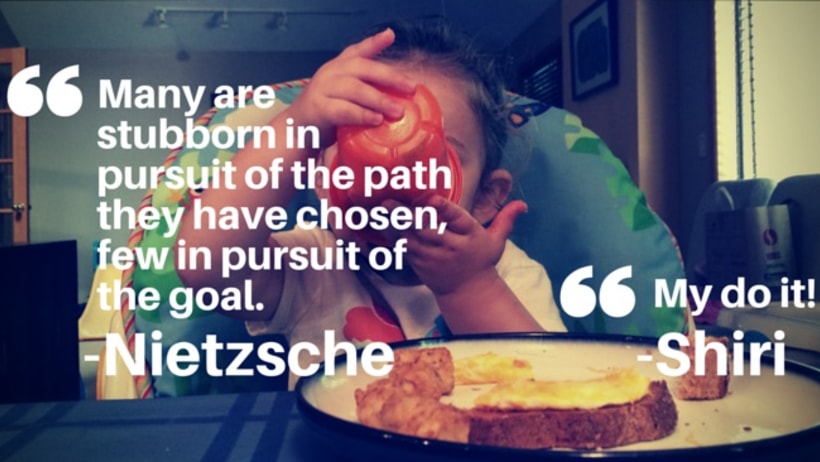I can be stubborn. It’s innate, and it’s among my less than desireable qualities. My mom will tell you I was a stubborn child, and I have no doubt she’s right, given the stubbornness Shiri exhibits more and more as she approaches two years old. However, I’m also convinced our stubborn ways aren’t closing us off to other ideas and opinions; they simply mean we stick to our guns where things like what we want to do with our days or exactly what we want to eat are concerned.

Shiri does things on her own terms, whether that means waiting to walk until well into her fourteenth month, refusing food until we can identify what she’s craving, or waking up early simply so we come in and hug her. I’ve heard countless times that a strong will is a good quality to have, as it usually means she will advocate for her needs. This independent stubbornness will most likely serve to her benefit as she grows. At the same time, it is extremely trying in a two-year-old.
We learn in our parshah this week, parshat Eikev, that raising a stiff-necked child is nothing new. The the Israelites were also stubborn. The parshah begins with a reminder of the blessings and rewards of success that will come to the Israelites if they guard and observe the Torah and all of its commandments. We are then reminded of our responsibility to remove idolaters from our midst. The final section of the parshah is a reminder of the Israelites’ experiences in the desert, their missteps and what they learned from each of these moments.
Chapter 9, verse 6 teaches, “Know, then, that it is not for any virtue of yours that the Lord your God is giving you this good land to possess; for you are a stiff-necked people. Remember; never forget how you provoked the Lord your God in anger.” This is basically a scolding of the Israelites, reminding them that they are receiving the Promised Land not because of their excellent behavior, but because they earned it in a battle of endurance.
“Stiff-necked” is not usually a compliment; we often think of it as a negative trait. It makes you think of people who are unwilling to change, who can’t take criticism. However, the commentary Exodus Rabbah gives this section of our text a different spin. “The stubbornness of the Jews in the face of persecution has enabled us to remain Jewish through the centuries.” In other words, without this stubborn nature, the Jewish people would not have stood the test of time.
And when you think about it, the very narrative we live by is the most stubborn part about us. When you think of the Torah scroll, what comes to mind? The atzei chayim, the handles at the ends of the center dowels, are incredibly stiff-necked to support the weight of our history. The text contained within it is a stubborn, unchanging document, and the stubbornness is reinforced year after year because we cycle through the exact same parshiyot.
Yet, as conservative Jews we have managed to find the balance between sacred, stubborn tradition and lifestyle choices that don’t hermetically seal our culture and cut it off from the world. We argue, we question, we test our limits. Welcome to Judaism 101 – yes, you’re in the right place. Maybe that’s why as frustrating as Shiri’s stubbornness can be, it’s also a huge relief, because I know that even at her young age, she’s embracing her heritage. Now if I could only get her to eat carrots.
-Rabbi Eve Posen
Source: Stubborn and Stiff-necked – Parshat Eikev 5775 – Rabbi Eve Posen



